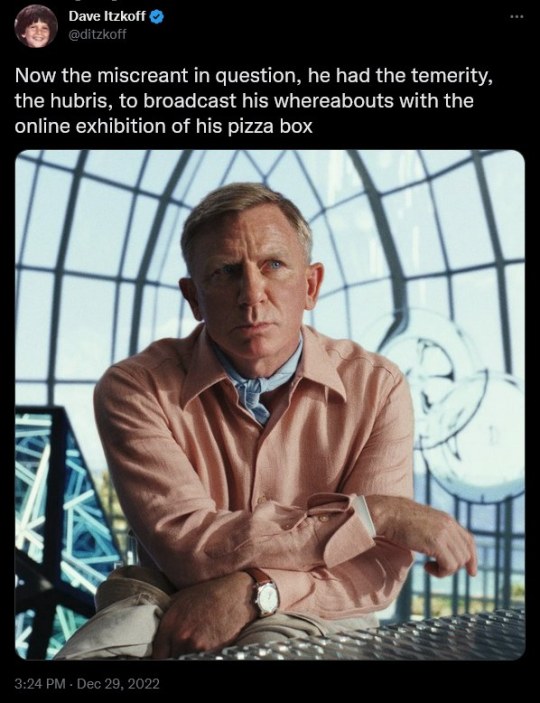Photo
I gave it two episodes.
Rachel Weisz does her best with what on-the-nose try-hard schlockier-than-thou eat-the-entitled-megarich cartoonish writing she is given but, good as she is, she’s not enough to hold me.
The writing? There is nothing that the writing can’t feel it needs to make more obvious.
It’s not enough that Elliot is the more verbal of the two, wearing her hair flowing loose while Beverly’s is neatly split down the middle and tied behind her head - we also need a character spelling out “you’re into the whole delayed gratification thing”, sandwiched in scenes of Elliot’s coke-fueled bathroom stall one-night stands, and a bit where she crawls her way through a kitchen counter in all fours, stuffing food in her mouth.
It’s not enough that her main lead for an investor is a woman whose family caused the opioid epidemic - her advisor board has to have a cultish following of absurd health trends, including trepanation.
And why is this mega-rich asshole that neither of them likes their sole investment lifeline for the center? The twins are based in Manhattan, are admittedly famous in the city, and live in a spectacular flat that has to be worth at least half what they are looking to raise - surely there must be other investors in their circle who aren’t walking caricatures?
TV series have one advantage over movies: time. You don’t need to compress everything into a couple of hours. You can use that time to grow your characters, to provide nuance, to make sure we know them.
That would allow us to spend more time looking at the dynamics of the Mantle twin relationship, instead of having to settle for something that’s slathered on with a paint roller so the writers can lock us up again in the anti-asshole-billionaire strawman argument echo chamber.
Instead these two episodes choose to spell everything out for us and reduce the twins to a difference in sexual orientation, moral compass, and hairdo; all so we can spend more time with idiots who aren’t the point.

Aw crap. There’s a Dead Ringers TV series now.
On the one hand, it’s a series version of one of my favorite David Cronenberg movies, which featured one of my all-time favorite Jeremy Irons performances. Add that to it being a reboot, or a remake, or what-have-you, and them’s some hurdles to clear.
On the other hand, it stars Rachel Weisz, who now only I love seeing but is one of my favorite actresses to play people who are just slightly off.
(See: Complete Unknown)
Sigh.
I’ll roll the dice on this one.
12 notes
·
View notes
Photo

Aw crap. There's a Dead Ringers TV series now.
On the one hand, it's a series version of one of my favorite David Cronenberg movies, which featured one of my all-time favorite Jeremy Irons performances. Add that to it being a reboot, or a remake, or what-have-you, and them's some hurdles to clear.
On the other hand, it stars Rachel Weisz, who now only I love seeing but is one of my favorite actresses to play people who are just slightly off.
(See: Complete Unknown)
Sigh.
I’ll roll the dice on this one.
12 notes
·
View notes
Text
The Bastard Son & The Devil Himself

Goddamned Netflix fucking up a good thing.
I learned too late that The Bastard Son & The Devil Himself, a new series that kept popping up in my attention sphere, was created by Joe Barton. Barton wrote The Ritual, which was a thrilling guilt trip, and the sensational Giri/Haji, which remains the best piece of original Netflix programming I’ve seen. He has a gift for mean, and violence, and convoluted relationships
By the time I learned about its existence and re-subscribed to watch it, Netflix had canceled it.
This is why they can’t keep their subscriber base - every time they have a piece of interesting, original content, they reach for the axe unless the series immediately spawns a craze that involves everything from t-shirts to mobile games to pachinko machines.
Half-Bad had my attention from the start, with its beginning that hint at a grungy Sapphire and Steel, getting to magic and the boots-on-the-ground trying to keep it from regular people right away. It quickly evolves into something more, however, with a somewhat on the nose set up of the UK as a witch police state, racism along the clearly delineated groups of Fairborn (proper, established, school-educated) and Blood witches (this world’s magical gypsies), and both groups’ attention on Nathan Byrne, a mixed-race kid that most everyone seems to be terrified of.
That’s about as much as you need to know in order to savor the bits that Netflix has allowed us to have.
It’s still worth watching, even if it doesn’t wrap everything up neatly, even if it relies too much on Paul Ready’s weak portrayal of Soul O’Brien in the last few episodes, and loses steam in the process.
There is a flavor there, coming off the mostly unknown actors doing their damnedest for a gig that may be their one shot. You can taste it from the credits music, from that gorgeous, colorful introduction of hovering blood petals coming down onto the scared witch investigators. There’s a flower there, waiting for the right conditions, for more of Ceelia’s crunchy delivery and Mercury’s purring, hoping to give you more of that gorgeous sex deathgasm that is the decimation, of the likely doomed emotional triangle.
But it doesn’t get enough time to bloom.
#the bastard son & the devil himself#joe barton#jay lycurgo#nadia parkes#paul ready#emilien vekemans#karen connell
0 notes
Text
Alien: Isolation

I want to be able to love Alien: Isolation.
It gets so much of the environment right. That late 70s visual design. The droning blips of old tech, green CRTs and bulky IBM-like keyboards all over the place. The feeling of being alone in a cavernous installation, where even people might turn against you. The way it manages to make you worry about making too much noise even before you get to the titular critter.
All that is great, until you encounter the read-the-designer’s-mind gameplay, where you are supposed to solve puzzles or get out of situations in exactly the way they intended; how enemies communicate telepathically and they swarm the last place one of them happened to glimpse you; or how you can only create distractions in the exact way the designers meant - apparently Amanda Ripley has never heard of throwing a glass or bottle.
Ah yes, Ripley. Our character is Ellen Ripley’s daughter, looking for closure years after her mom disappeared. A clever conceit, if it wasn’t such a blatant way to start rattling off the “Alien’s greatest hits”. By the time we get to the base and start reading off messages referring to some misbehaving AI and “working Joes”, you know it’s not just going to be the one monster chasing you.
I didn’t get too far. For all I know it’s a gaming masterpiece that establishes the new Xenomorph canon, but having to repeat sections because three scavengers suddenly turned into sharp-shooters who can see perfectly in a mostly-dark room while instantaneously sharing my last-known location was too annoying. I was into the game for a scare or three, not a regular stream of ragequits.
Nothing kills the mood like having to revisit a scene, fishing for an opening over and over, like you are trapped in a Giger-themed Groundhog day.
0 notes
Text
It - Chapter 2

I don’t know what possessed Andy Muschietti and to add all the inopportune jokes to It - Chapter Two.
It’s otherwise a tight adaptation of Stephen King’s book, streamlining his somewhat baroque setup by removing some extraneous elements that added little value (Bev’s husband, Bill’s wife) and some weird-ass likely cocaine-powered decisions (the turtle, teen gang-bang). Bill Skarsgård’s Pennywise is unsettling in a way that Tim Curry’s never achieved. It even manages to capture that flavor of King’s that others have a hard time getting right: the feeling of friends getting back together, finding their rhythm, finding each other again. An optimism that there are people who will be there for you no matter, despite whatever else gets slathered on top. That things back then were relevant, important, meaningful enough to matter even now.
But those fucking joke-y interruptions murder tension whenever things are starting to pick up. It’s already hard enough to remain scared when the CGI monsters look like Gollum’s acromegalic, alcoholic grandma, without an absurd ha-ha music joke as purportedly terrified characters are confronting their fears.
I’ve gone back to it a couple of times, the theme drawing me back. I stick around for those scenes where Muschietti and writer Gary Dauberman do let things play out, like with the multitude of faces that fight to get into Bev’s bathroom stall, or the presence that chases Ben at school.
But it’s too intent on defusing almost every single moment it builds up to, like it’s afraid you might get too scared and change the channel, so it ends up doing a better job at the nostalgia than the horror.
0 notes
Text
Spiderlight

Spiderlight is easy to recommend, inasmuch as it is trivial to describe to its intended audience.
It’s a high fantasy party-deciphering-prophecy-to-rid-the-land-of-the-dark-lord kinda novel, with a wry sense of humor, which feels as if you are listening to the inner thoughts of four self-important RPG nerds who take the campaign way too seriously, while the game master tries to nudge them out of their comfort zone and make them look past the tropes, to mostly humorous but sometimes morally wrenching results.
If that piqued your interest, I’ll throw in a freebie: at one point there’s even a theological discussion that would fit impeccably as a Secret of Monkey Island sword duel.
Does that help seal the deal? Because if it even half-sounds like your kind of morsel, it’s delicious.
It’s not groundbreaking, the way Glen Cook’s Black Company series was, with his focus on seeing fantasy from the point of view of a bunch of foot soldiers, while managing to retain the epic scope.
But it’s enjoyable, human, well thought-out, and wholly self-contained, while somehow conveying that Tchaikovsky has met the very same RPG crew you used to hang out with.
0 notes
Text
Titane

Titane, the second movie by French filmmaker Julia Ducournau, is…
Titane is…
Titane is demented, unpleasant, sensual, and absolutely the wrong movie to write about when getting back on the movie-writing horse.
You met Alexia immediately, as a child, when her raw petty unpleasantness causes a car accident which she survives, but results in her needing a titanium plate in her skull. The moment Agathe Rousselle’s adult Alexia walks into a car lot, some indeterminate decades later, wearing her scar like a proud brand, and we see the group of people simping after the gaggle of car dancers and asking for their autograph, you can smell Crash coming at you at well over the speed limit.
It’s a suspicion that gets almost immediate confirmation, in a scene of froth and drool coming out in a frenzied stream as so much ejaculate, as the movie becomes violent and unpleasant - right before making a turn into straight nuttery that makes you think “alright, it’s Crash meets Christine”.
That, right there, would have been a bizarre enough experience. I’d have watched it and be here singing odes to its inventiveness. It’s not enough for Ducournau, though, who has in mind a nastier story of bizarro behavior, violence, manipulation, and several shades of mental illness, with a nice glaze of unreality on top. Alexia is a wildfire, consuming and uncaring, unbalanced and out of control. It can’t last, and Ducournau is well aware of it, unexpectedly changing lanes into something that - in comparison to the first half hour - feels positively domestic, while at the same time managing to engender even more dread.
For all the comparisons to Cronenberg’s Crash, it is closer to Spider and Dead Ringers, by way of Possession and Tetsuo: The Iron Man. The flesh is weak. Blood will out.
0 notes
Text
Everything Everywhere All At Once

I don’t even know where to begin with this one, other than with the single line I wrote on my notebook.
Fucking masterpiece.
Closest I can get is that it’s as if Michel Gondry and Stephen Chow had made a pastiche of John Carpenter, Shane Carruth, and Wong Kar Wai, after watching too much Doom Patrol. All while mixing kung fu and humor to show that existentialism and nihilism are two ends of a horseshoe.
It is the most original, joyful, creative, willfully absurd, life-infused movie I have seen since … um … I don’t even know. I’ll get back to you on that one, if I manage to think of anything that comes even a few timelines close.
For now, only know that I'm as happy about all the accolades the movie is getting as if everyone involved was a close friend.
#Everything Everywhere All At Once#EEAAO#Michelle Yeoh#Ke Huy Quan#Jamie Lee Curtis#James Hong#Daniels
2 notes
·
View notes
Text
Oh dear.
atlus went for the throat with tae takemi. imagine being a teenager in puberty and an older goth woman who wears a lab coat over a tiny dress with platform stilettos whos super sketchy and treats you like a guinea pig and lets you buy opioids from her and takes you on a ferris wheel ride and
296 notes
·
View notes
Text
Reading this again now, and I want to be able to experience both the series and book anew.
Writing gives you that, sort of - the going back in a machine to what you saw, back then, with different eyes.
Bakemonogatari: Part 1

I have a problem writing about Bakemonogatari Part 1: Monster Tale, the book that started the Monogatari series. Let me summarize the problem in one sentence:
Senjōgahara is a battlefield.
If you have seen the Monogatari series, that phrase makes sense - it even fits her. If you haven’t, you are likely expecting some more details.
Let’s see.
When translated as battlefield, Senjōgahara refers not to any historical battle, but to a mythical one.
Did that help?
No. Not newcomers, I bet, but a lightbulb is going on above the heads of those who know who she is.
And that’s my problem.
By this point, I’ve gone through the anime adaptations of Bakemonogatari (different, arresting), Nisemonogatari (fool’s errand), Nekomonogatari: Kuro (endearing, violent), and a good chunk of Monogatari: Second Season (mixed, often brilliant). I’ve read - and written about - Kizumonogatari, the prequel which tells the story at the root of the stories.
I know these people and what they are about. Reading the recently translated Bakemonogatari helped fill in blanks I didn’t know I had about them, things I may have missed during the series, or which were not translated at all.
If you don’t know anything about the series, I’d suggest going over my Bakemonogatari review. If that sounds like your type of shadow play, by all means, get the book.
I enjoyed it, even if the second section drags on a bit, and it enhanced the taste of my Bakemonogatari memories.
I suspect this is going to be more of a dissection than a review. It’ll make more sense if you are in the know and will contain spoilers.

Chapter 1: Hitagi Crab
Hitagi, the haughty girl without any friends. I took her as detached but popular. The ice queen everyone fawns over.
Hitagi, who would push others away if her own mass allowed her.
Hitagi, poor Hitagi, acting as if she’s used to her altered social and physical conditions, but still combating them.
How did I forget what had caused Hitagi to encounter the crab?
How did I forget she had almost been raped? That she had wanted to get rid of the weight of what happened to her family, how she feels guilty for fighting back? How did I not see the connection between this event and how hesitantly she approaches Araragi later, accusing him of being a pervert, unsure if to open up to him? How did I not perceive the weight of how she offers to sell herself to pay Kaiki, what I took as a dramatic off-hand remark actually something she must have had to work herself up for? How did this not add to the tenderness of that final Bakemonogatari episode?
Hell, how did I forget she had brought the crab upon herself in the first place?
It’s the same pattern they all follow. Other than the few Kaiki curses, they all bring the aberrations upon themselves. Even silly Araragi Koyomi sticks his neck out for no reason to save a bakemono.
Funny that a bakemono is an “altered thing”, something that has been alienated from its own nature. If anything, all characters in this story get closer to it once they are affected.
And what about Hanekawa, who back here was studying for college? Was she doing it just to help Araragi? Otherwise, when did she change her mind? Reading about that now I’m glad she decided to go wander the Earth.
You should be true to yourself.

Chapter 2: Mayoi Snail
Mayoi Snail has a weight I never got from the series. It feels somewhat rambling, stretched too far because he has a word count to make. It has a pay-off, but I’ll be damned if he doesn’t go on and on and on…
It was only reading chapter 2, nominally about Hachikuji Mayoi, that I realized that it’s about Hitagi and Koyomi’s interactions, her hesitant courtship. It didn’t hit me when I saw the series. It’s also the longest they’ve been visibly together since that first season ended. Their relationship shapes the entire series, but we have barely encountered them together since.
Back here she was still playing her oh-but-do-I-mean-it? game. She pushed. She retreated. She proposes to Araragi, declares her love in so blatant terms it seems like deadpan humor. I can’t tell if he is acting oblivious, or just is.
Hitagi, traumatized by her alienation. She never mentions Mayoi because she is afraid that she might be in the wrong. If Araragi acts weird, it should be Hitagi’s own fault.
Mayoi herself is a much sadder character than I’d realized. In the series, she seems just a rowdy caricature of an over-caffeinated pre-teen. Here it’s clear she pushes Araragi away because she doesn’t want him losing his way. She refuses her function, abhors her nature.
I didn’t expect to like Mayoi Snail, with its meandering style that gets lost as easily as its namesake. At times it has a whiff of existing just to reach a contractual word count. But if anything, it’s convinced me that there’s nothing arbitrary about NisioIsin’s writing.
I have the series too well implanted in my head, so I may be just seeing shapes in the clouds, but the way it feels as it fills in the cracks in my memory is both pleasant and surprising.
17 notes
·
View notes
Text

It has been 26 years since Big Night came out and, for whatever reasons, I didn’t watch it until tonight.
It feels true, and entrepreneurial, and bittersweet in the way that trying to find your own way usually does.
How do I meet Stanley Tucci to give him a hug for it?
2 notes
·
View notes
Text
No.
The person who ran next to your car when you were a child.

88K notes
·
View notes





